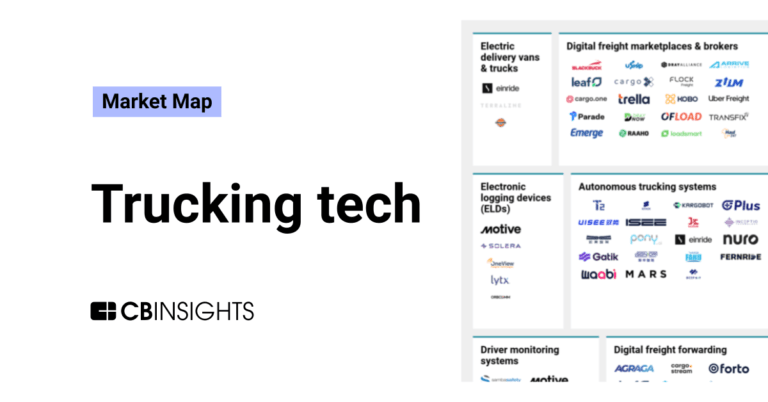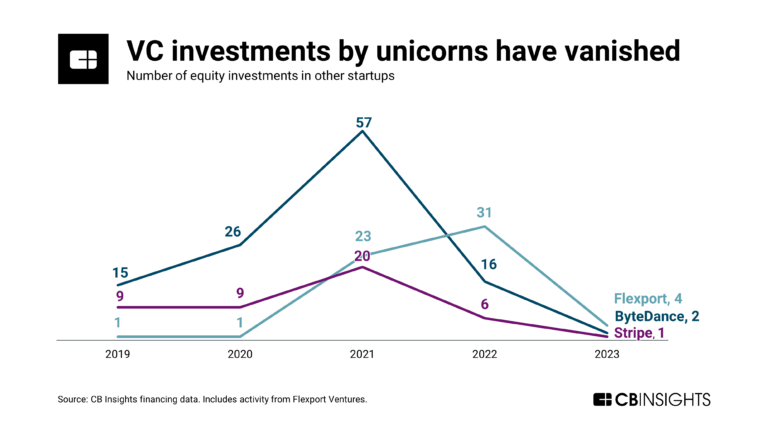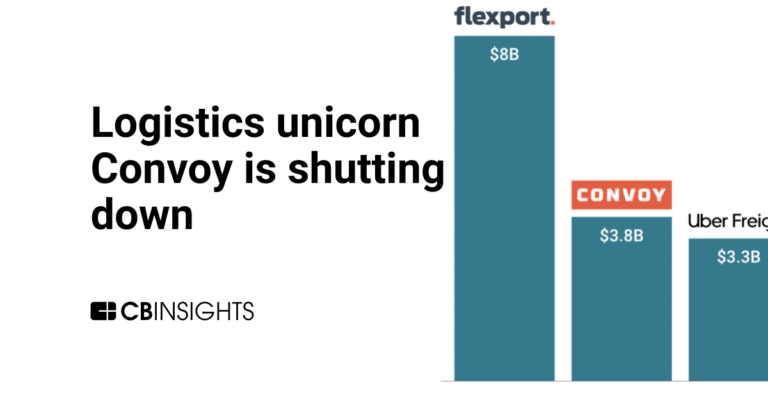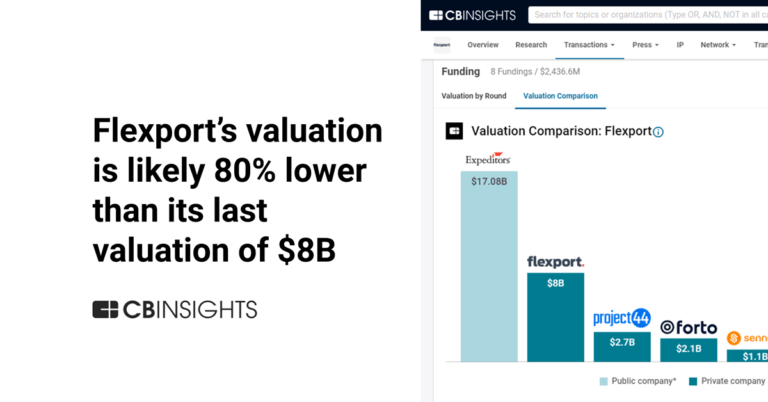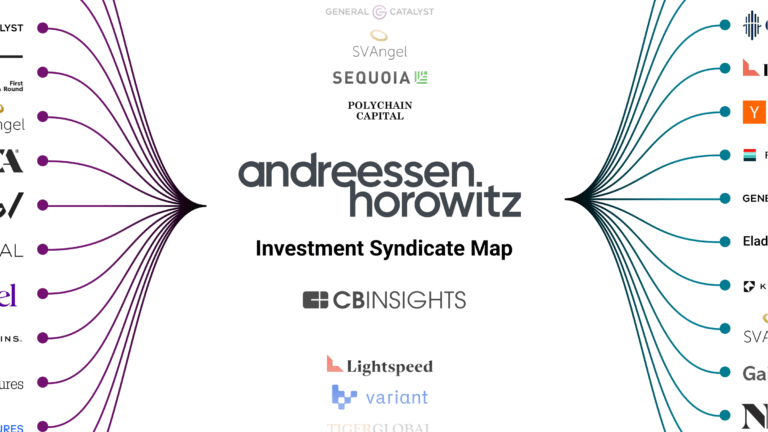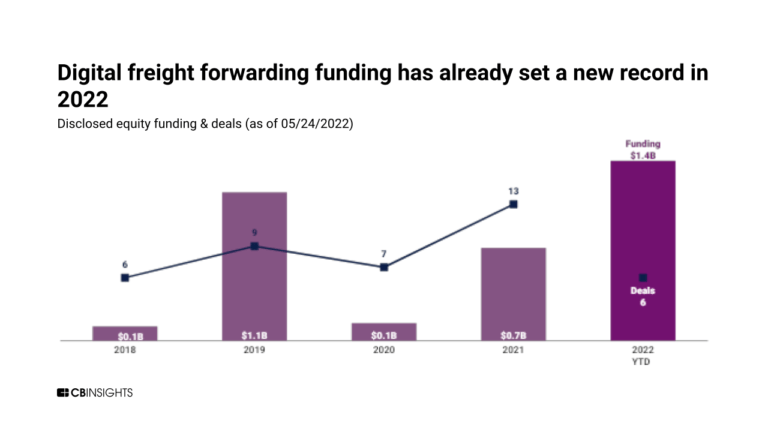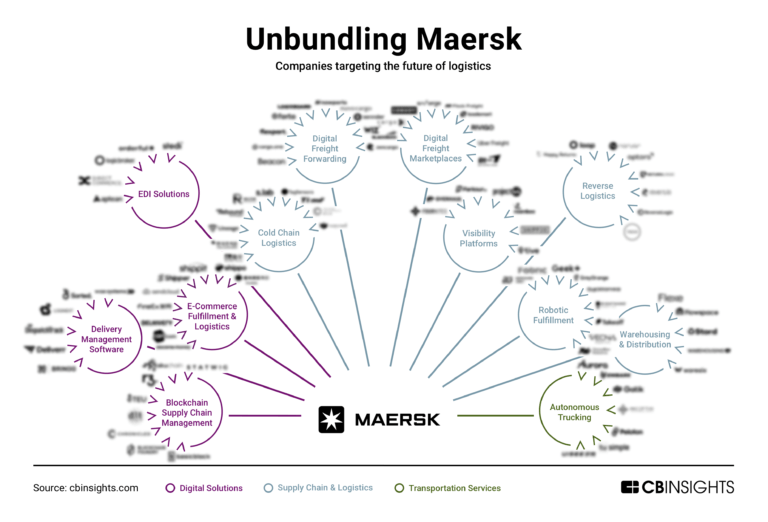
Flexport
Founded Year
2013Stage
Convertible Note | AliveTotal Raised
$2.747BLast Raised
$260M | 8 mos agoRevenue
$0000Mosaic Score The Mosaic Score is an algorithm that measures the overall financial health and market potential of private companies.
-43 points in the past 30 days
About Flexport
Flexport operates as a technology-driven company focused on logistics and supply chain. The company offers a range of services including logistics management, transportation, customs brokerage, and various freight services, all aimed at simplifying and optimizing supply chain operations. Its primary customers span across various sectors, including e-commerce, global brands, and nonprofits. It was founded in 2013 and is based in San Francisco, California.
Loading...
ESPs containing Flexport
The ESP matrix leverages data and analyst insight to identify and rank leading companies in a given technology landscape.
The digital freight forwarding market helps shippers manage the end-to-end shipment of freight around the world. These providers offer solutions for automated booking, streamlined pricing, real-time shipment tracking, enhanced inventory visibility, and improved stakeholder communication. Platforms may also use artificial intelligence and machine learning to automate previously manual tasks.
Flexport named as Leader among 15 other companies, including The Maersk Group, Kuehne + Nagel, and DSV.
Loading...
Research containing Flexport
Get data-driven expert analysis from the CB Insights Intelligence Unit.
CB Insights Intelligence Analysts have mentioned Flexport in 16 CB Insights research briefs, most recently on Mar 21, 2024.
Expert Collections containing Flexport
Expert Collections are analyst-curated lists that highlight the companies you need to know in the most important technology spaces.
Flexport is included in 5 Expert Collections, including Supply Chain & Logistics Tech.
Supply Chain & Logistics Tech
5,558 items
Companies offering technology-driven solutions that serve the supply chain & logistics space (e.g. shipping, inventory mgmt, last mile, trucking).
Unicorns- Billion Dollar Startups
1,244 items
Conference Exhibitors
6,062 items
Companies that will be exhibiting at CES 2018
Tech IPO Pipeline
568 items
Fintech
9,294 items
Companies and startups in this collection provide technology to streamline, improve, and transform financial services, products, and operations for individuals and businesses.
Flexport Patents
Flexport has filed 13 patents.
The 3 most popular patent topics include:
- data management
- logistics
- management accounting

Application Date | Grant Date | Title | Related Topics | Status |
|---|---|---|---|---|
3/29/2019 | 12/20/2022 | Supply chain management, Production and manufacturing, Intermodal containers, Distribution (business), Logistics | Grant |
Application Date | 3/29/2019 |
|---|---|
Grant Date | 12/20/2022 |
Title | |
Related Topics | Supply chain management, Production and manufacturing, Intermodal containers, Distribution (business), Logistics |
Status | Grant |
Latest Flexport News
Sep 20, 2024
Change may be stirring in the apparel, retail and logistics industries as new trade -focused rules get developed by an outgoing president and his administration. The de minimis provision, which currently allows goods valued under $800 to enter the United States without tariffs or scrutiny from Customs and Border Protection ( CBP ), could soon be changing, due to an executive action announced by the Biden-Harris administration last week. Although formal rules have yet to be put forth, the administration noted it planned to change exemption statuses of some goods classified under Section 201, 232 and 301. The proposed changes would require increased classification and further disclosure about the items included in shipments entering the U.S., and would impose tariffs on direct-from- China goods that previously have not been subjected to those costs. Ryan Petersen, CEO of Flexport , said that the potential for changing regulations could cost some brands and retailers—particularly those reliant on China-direct shipping—millions of dollars. While the tariffs themselves account for a large part of that cost increase, he said, so does the reality of classifying every product through a customs broker like Flexport . Related Stories That cost surges more as the number of items increases. Companies like Shein and Temu have famously capitalized on what many call the de minimis “loophole.” But, should the Biden-Harris administration formalize rules around their proposals for the provision, those businesses are likely to spend more time and money classifying and labeling the goods they send from China to the United States. “If your catalog is pretty stable, then it’s a one-time expense per product to get it classified properly. So if you have the same products over and over again, then it’s not that big of a deal. But if you’re a fast-fashion brand that’s constantly releasing new products, every time you have a new product, you have to go through that hurdle,” Petersen said. “It’s kind of level playing field with other brands that don’t use de minimis, that…import them in bulk, rather than one at a time.” Despite the added costs, Petersen doesn’t expect that Chinese-founded e-commerce companies will back down from a U.S. consumer thirsty for value and low prices. “Flexport does classification work for some of the biggest fast-fashion brands in the world—not the Chinese ones, but European fast-fashion brands. It’s entirely possible to do even while you have a really dynamic catalog changing every couple of weeks.…I don’t think it’ll be a major hurdle for them. I think that the thing that will be very difficult is if these rules come out on a short notice and are imposed [quickly].” A spokesperson for Temu denied the company’s purported reliance on de minimis. “Temu’s growth does not depend on the de minimis policy. We are monitoring the developments and remain committed to delivering value to consumers,” the spokesperson said in an emailed statement. A Shein spokesperson said the company will work to comply with U.S. regulations, regardless of the rules that are eventually set forth. “Shein makes import compliance a top priority, including the reporting requirements under U.S. law with respect to de minimis entries,” the spokesperson said via email. “We reaffirm the comments our executive chairman, Donald Tang, made in his letter to the AAFA last year, which called for de minimis reform to create a level, transparent playing field – where the rules are applied evenly and equally. We look forward to working with all stakeholders on reform.” Both Shein and Temu’s spokespeople noted that on-demand business models give them the ability to offer consumers rapid-turnaround styles at low prices. Each of the two companies have been setting up U.S.-side logistics entities for their marketplace sellers; Flexport works on fulfillment for Shein’s U.S. marketplace business. Petersen and Ram Ben Tzion, founder of Ultra Information Systems, both said that companies like Shein and Temu are far from the only ones using, or in some cases abusing, the current de minimis rules. “I don’t think there is a brand in fashion that doesn’t somehow benefit from de minimis. They all have adapted to the availability of cheap shipping, real-time supply, but [legacy brands] have an alternative, because they had to put in place a logistics mechanism that will allow them to serve their physical stores,” Ben Tzion said. Those alternatives—whether relying on ocean freight, diversifying the supplier network outside of China or otherwise—could soon be a boon to legacy brands trying to compete in a market saturated with low-priced e-commerce goods. “It’s not that traditional brands will not be impacted by the change, but they will have an alternative, and therefore they can accommodate or adjust and still do business and perhaps do even better,” Ben Tzion noted. Even with a plan B in place, brands and retailers should still plan for hidden costs throughout the supply chain, even beyond what the uptick in classification and tariffs will cost. If de minimis rules change, international air freight services may become too costly an option to keep up with when considering the other costs added into a company’s supply chain. Many legacy brands don’t rely solely on air freight, instead using both air freight and ocean freight to build robust supply chains. Soon enough, if the Biden-Harris administration’s rules pass, using air freight could become increasingly costly, causing a shipping shift favoring maritime in the long term, Ben Tzion said. “A lot of companies that have built an e-commerce or an interconnected supply chain model will need to reconsider their value chain. For the more traditional brands, that’s great news,” he said. “First of all, everybody needs to play by the same rules. Second of all, they have an infrastructure in place that combines both physical and online presence. That’s going to be a huge advantage.” Simultaneously, though, the cost of ocean freight could increase if demand for cargo space goes up rapidly. In the early days of a shift toward increased maritime trade usage, companies may face high demurrage fees from overwhelmed providers and ports. In the mid-to-long-term, though, Ben Tzion said the logistics industry will learn to and work to accommodate higher volumes, should they remain consistent, which means increased fees from things like demurrage would have less of an impact on shippers and importers. De minimis is far from the only factor at play in today’s logistics and supply chain landscape. A potential strike at the U.S.’s East Coast ports looms, with each passing day bringing a slew of industries closer to the reality of a shutdown. Petersen said that if the Biden-Harris administration’s purported new rules came down around or during an impending East Coast port strike, it could be bad news for retailers—both from a cost perspective and from a shipping speed perspective. It’s possible that, in the short term, companies would flock to air freight, which is already more expensive, before transitioning their businesses back to—or into for the first time—a reliance on cargo shipping. “If that [strike] were to happen on October 1, I think you’ll see the price of air freight really go to the moon because…it’s already peak season, and these planes are already pretty full,” Petersen told Sourcing Journal. “The scale of the ocean network compared to the air network is really more than one order of magnitude larger, so if a small percentage of the cargo flipped over from ocean to air as a result of the port strike, you’d see the price go crazy… “Between the government’s [potential] new customs regs and the potential union action, it’s a very difficult moment to run a retail business.” Read More About
Flexport Frequently Asked Questions (FAQ)
When was Flexport founded?
Flexport was founded in 2013.
Where is Flexport's headquarters?
Flexport's headquarters is located at 760 Market Street, San Francisco.
What is Flexport's latest funding round?
Flexport's latest funding round is Convertible Note.
How much did Flexport raise?
Flexport raised a total of $2.747B.
Who are the investors of Flexport?
Investors of Flexport include Shopify, KKR, Fabrica Ventures, CrossWork, Founders Fund and 32 more.
Who are Flexport's competitors?
Competitors of Flexport include Shippeo, NEXT Trucking, MightyFly, Nuvocargo, Morpheus.Network and 7 more.
Loading...
Compare Flexport to Competitors

Project44 is a company that focuses on supply chain visibility in the logistics and transportation industry. The company offers a platform that provides real-time tracking of shipments, enabling proactive management of inventory in transit, optimization of carrier and lane performance, and management of port congestion. It primarily serves sectors such as consumer goods, food and beverage, retail, manufacturing, and life sciences. It was founded in 2014 and is based in Chicago, Illinois.

Zencargo is a digital freight forwarder specializing in supply chain management within the logistics industry. The company offers a suite of services including ocean, air, and road freight solutions, complemented by a technology platform that provides tracking, data analytics, and inventory management. Zencargo's platform streamlines supply chain operations, offering insights and tools for businesses to make informed decisions and optimize their logistics. It was founded in 2017 and is based in London, United Kingdom.

FourKites specializes in supply chain intelligence, offering a platform that provides real-time visibility and execution across various transportation modes. The company's services include tracking multimodal shipments, optimizing inbound logistics, providing order lifecycle insights, managing inventory, and innovating yard logistics. FourKites serves a diverse range of sectors, including food and beverage, retail, consumer packaged goods, chemical, oil and gas, manufacturing, and pharmaceuticals. It was founded in 2014 and is based in Chicago, Illinois.

Tive is a global leader in providing real-time supply chain visibility solutions. The company offers products and services that enable the tracking of shipment location and condition, utilizing sensor technology and a cloud-based platform to deliver actionable insights. Tive primarily serves sectors such as food & beverage, high-value goods, life sciences, and transportation & logistics. It was founded in 2015 and is based in Boston, Massachusetts.
Gruzobzor is a freight and trucks matching service focusing on the b2b logistics sector. The company provides an online platform where carriers, shippers, and forwarders can exchange offers and manage freight and truck information. Gruzobzor offers additional tools such as a distance calculator with fuel cost estimation and weather forecast integration to facilitate logistics planning. It is based in Russian Federation.
Arviem specializes in providing real-time cargo tracking and monitoring services, focusing on enhancing supply chain visibility and security across various industries. The company offers solutions that enable accurate location and condition monitoring of shipments, utilizing sensor-based technology to ensure the integrity and quality of cargo during transit. Arviem's services cater to cargo owners, exporters, importers, and manufacturers, particularly those dealing with high-value, sensitive, or mission-critical goods. It was founded in 2008 and is based in Baar, Switzerland.
Loading...
